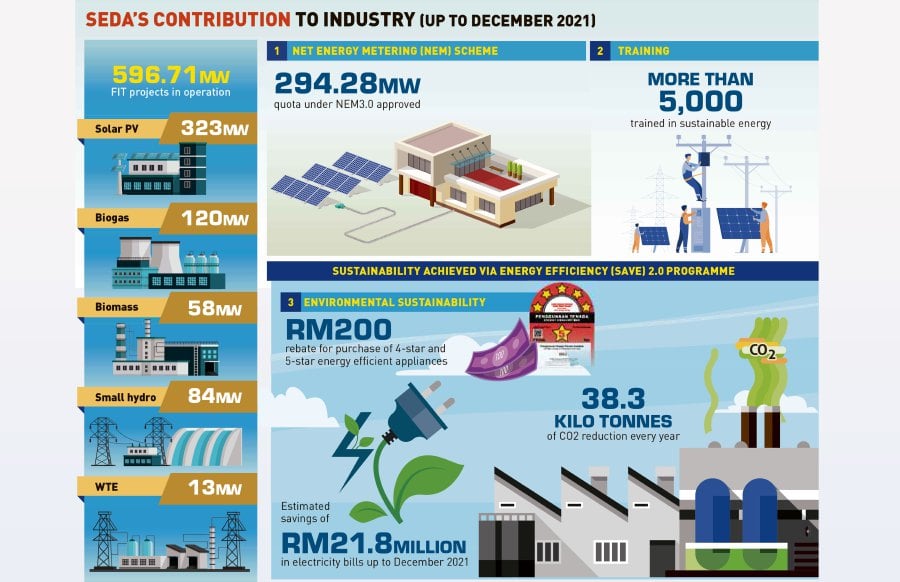Shaping a sustainable energy transition
18 Mar 2022

THE Sustainable Energy Development Authority (SEDA) Malaysia has set an ambitious target to attract new investments and create more jobs in Malaysia’s renewable energy sector.
The agency is aiming to attract investments worth RM19.93 billion and generate 28,416 jobs by 2025.
Since its inception in 2011, SEDA Malaysia has overcome many challenges and obtained many achievements in shaping the country’s sustainable energy transition.
Initially, the agency was tasked with overseeing the implementation of the Feed-in Tariff (FiT) mechanism that was introduced to ensure renewable energy becomes a viable long-term investment for companies, industries and individuals.
FiT allows certified Feed-in Approval Holders to sell or export energy to the national power grid at a recommended rate for a specific duration.
Energy producers are also entitled to benefits, such as the generation tariff and export tariff payment.
The sustainable energy resources eligible for FiT during its formative years were biogas, biomass, small hydro and solar PV.
The scheme is also the most-adopted renewable energy policy by countries worldwide due to its efficiency and effectiveness. Up to December last year, 596.71MW of FiT projects are in operation.
Five years later, SEDA Malaysia implemented the Net Energy Metering (NEM) programme since the FiT mechanism received overwhelming reception from stakeholders, particularly the solar power industry.
The programme, which started in November 2016, allowed building owners to consume electricity produced from the solar PV system in situ.
The owners could export and sell any excess of the generated electricity to distribution licensees such as Tenaga Nasional Bhd and the Sabah Electricity Sdn Bhd at the prevailing displaced cost prescribed by the Energy Commission.
Malaysians were also allowed to apply and instal solar PV systems on the rooftops of their homes, office buildings or factories.
However, unlike industry players, the applicants did not receive cash for the excess electricity generated. Instead, the applicants enjoyed lower electricity bills.
The NEM, therefore, was an energy efficient and an energy cost-saving measure since it reduced the consumption of imported electricity from utility companies.
While the solar industry received its electricity production quota via NEM, the biogas, biomass and small hydro industry players secured theirs through the FiT mechanism.
On Jan 1, 2019, NEM2.0 was introduced after the government agreed to allow excess solar electricity to be compensated on a one-on-one offset basis instead of the displaced cost.
NEM 2.0 garnered an exceptional welcome from industry players. The total renewable energy capacity approved in 2019 under NEM 2.0 was almost four times higher than the total capacity approved from 2016 to 2018.
On Dec 29, 2020, NEM3.0 was launched with three categories: NEM Rakyat, NEM GoMEn and NOVA. This propelled the NEM programme with 294.28MW of the NEM3.0 quota approved by December last year.
Besides implementing the FiT and NEM schemes, SEDA Malaysia also led two government-mandated energy efficiency projects in its inception year.
The first project was the Government Lead by Example (GLBE), in which the agency implemented energy-saving projects in 105 government-owned buildings using electricity extensively.
Meanwhile, the agency’s second project — the Sustainability Achieved via Energy Efficiency (SAVE) — intended to encourage the sale and use of energy-efficient appliances in households and business premises.
The programme that was launched in July 2011 rolled out rebates for the purchase of energy-efficient equipment to people and private entities.
Under the SAVE programme, Malaysians who bought five-star energy-efficient rated refrigerators and air-conditioners on a first-come first-served basis were entitled to rebate vouchers.
Private entities, meanwhile, received rebate vouchers if they replaced their inefficient electrical chillers with new efficient ones.
The second edition of the programme, dubbed SAVE 2.0, was launched last year after the government allocated RM30 million under the 2021 Budget for the programme.
Through the SAVE 2.0 programme, Malaysians were able to buy four- and five-star energy-efficient rated appliances, particularly refrigerators and air-conditioners, at a RM200 rebate.
The surge in online sales during the Covid-19 pandemic also prompted SEDA Malaysia to collaborate with major e-commerce players, namely Shopee, Lazada and PG Mall, for the programme.
This collaboration enabled small-and-medium enterprises and retailers to shift towards digitalisation by promoting their products online when the government enforced movement control orders. SAVE2.0 has estimated to save RM21.8 milllion of electricity bill by December last year, equivalent to 38.3 kilo tonnes of CO2 reduction every year.
This year, SAVE3.0 was launched with more appliances were added to the programme: refrigerator, air-conditioners, washing machine, microwave, rice cooker and television.
SEDA Malaysia also finalised the Malaysia Renewable Energy Roadmap 2035 (MyRER) on Dec 30 that will serve as a strategic framework for the country to host a low-carbon power sector. MyRER formulates strategies to achieve the government’s committed target to reach 31 per cent of RE share in the national installed capacity mix by 2025.
The agency was also entrusted to develop human capital and address competency gaps in the renewable energy sector.
In 2012, SEDA Malaysia initiated the solar PV training course for chargeman and wireman as well as for solar PV installers in 2013, and also published training modules related to Grid-Connected Photovoltaic (GCPV) design systems as well as on energy efficiency and energy management in 2013.
The agency also appointed higher learning institutes and research institutes as training partners to raise the level of competency on areas related to renewable energy for Malaysia’s workforce.
Up to last year, SEDA Malaysia has trained more than 5,000 people in sustainable energy.
Source: NST


